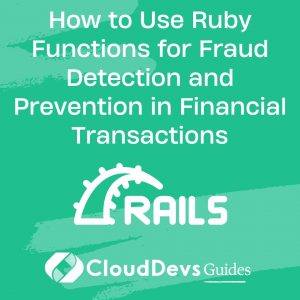Hiring Guide for Ruby on Rails Developers: Building a Robust Software Development Team
Ruby on Rails (RoR), commonly known as Rails, is a powerful and popular web application framework built on the Ruby programming language. With its elegant design and developer-friendly approach, RoR has emerged as a game-changer in modern software development. Its versatility, scalability, and rapid development capabilities make it a preferred choice for creating robust and innovative web applications.
Table of Contents
In today’s competitive digital landscape, hiring the right RoR developer is crucial to the success of your software projects. A skilled RoR developer brings not only technical expertise but also a deep understanding of best practices and industry trends. Their proficiency in Ruby language, extensive knowledge of the Rails framework, and ability to craft clean and efficient code ensure the development of high-quality applications that meet your business objectives.
In this hiring guide, we will explore the key considerations for selecting the perfect RoR developer who can contribute significantly to your software development endeavors. From assessing technical skills to evaluating cultural fit, we will help you navigate the hiring process and build a talented RoR development team that drives your projects toward success.
Let’s dive into the world of Ruby on Rails hiring and discover the path to assembling an exceptional development team.
1. Who is a Ruby on Rails Developer?
A Ruby on Rails developer is a skilled professional specializing in building web applications using the Ruby on Rails framework. They are adept at leveraging the powerful features of RoR to create scalable, efficient, and user-friendly web solutions. As a vital member of a software development team, a RoR developer plays a pivotal role in the entire application development lifecycle, from conceptualization and design to implementation and maintenance.
Role and Responsibilities
The responsibilities of a Ruby on Rails developer encompass various aspects of web application development. They are tasked with the points mentioned in the below list.
- Application Development: Designing and developing web applications, adhering to the best practices and principles of RoR to ensure a robust and maintainable codebase.
- Database Management: Integrating databases with the application using RoR’s built-in ORM (Object-Relational Mapping) capabilities to handle data efficiently.
- Front-End Implementation: Collaborating with front-end developers and designers to implement responsive user interfaces using HTML, CSS, and JavaScript.
- Testing and Debugging: Conducting thorough testing and debugging to identify and fix any issues, ensuring the application’s reliability and performance.
- Performance Optimization: Employing optimization techniques to enhance the application’s speed and efficiency, delivering an excellent user experience.
- Version Control: Utilizing version control systems like Git to manage code collaboration effectively and track changes.
Key Skills and Expertise
A competent Ruby on Rails developer possesses a range of key skills and expertise including;
- Ruby Language: Proficiency in the Ruby programming language, including its syntax, principles, and conventions.
- Rails Framework: Thorough understanding of the Rails framework, its components, and its ability to accelerate the development process.
- Web Technologies: Familiarity with HTML, CSS, and JavaScript, enabling seamless front-end integration.
- Database Management: Experience in working with databases, writing complex queries, and using Rails’ database abstraction layer.
- Problem-Solving: Strong problem-solving abilities to tackle technical challenges and find efficient solutions.
- Testing and Debugging: Knowledge of testing frameworks and debugging tools for ensuring code quality and reliability.
Background and Experience
Ruby on Rails professionals typically hold a degree in Computer Science, Software Engineering, or a related field. They may have completed specialized RoR training or acquired certifications to validate their skills. Ideal candidates have practical experience working on RoR projects, demonstrating their ability to build and deploy successful web applications. Junior developers may have completed internships or entry-level positions, while mid-level and senior developers often possess an extensive portfolio of completed projects, showcasing their expertise in Ruby on Rails development.
2. Why Choose Ruby on Rails for Software Development?
Ruby on Rails (RoR) has gained immense popularity in the software development world for several compelling reasons, making it an excellent choice for web application development.
2.1. Advantages of Using Ruby on Rails
- Elegant and Readable Code: RoR follows the “Convention over Configuration” principle, allowing developers to write clean, concise, and highly readable code. This enables efficient collaboration and code maintainability within development teams.
- Rapid Prototyping: With RoR’s built-in libraries and ready-to-use modules, developers can rapidly prototype and develop Minimum Viable Products (MVPs), significantly reducing time-to-market for new applications.
- Developer-Friendly: Ruby, the language behind RoR, is known for its developer-friendly syntax and straightforward learning curve. This makes it accessible to new developers and encourages faster onboarding.
- Modular Architecture: RoR’s modular architecture promotes code reusability and scalability, allowing developers to build complex applications by integrating small, manageable components.
- Active Community Support: RoR benefits from an active and enthusiastic community of developers and contributors. The extensive community support ensures continuous improvement and timely resolution of issues.
2.2. Ease of Use, Speed of Development, and Productivity Benefits
- Scaffolding: RoR provides scaffolding functionality, automatically generating code and directory structures for common tasks. This streamlines development and saves time, particularly during the early stages of a project.
- Convention over Configuration: RoR’s adherence to conventions reduces the need for manual configuration, enabling developers to focus on building application logic rather than handling boilerplate code.
- Gems and Libraries: RoR boasts a vast ecosystem of gems and libraries that simplify and accelerate development, allowing developers to leverage pre-built solutions for common functionalities.
- Automated Testing: RoR encourages Test-Driven Development (TDD) by providing a framework for automated testing. This ensures code quality and reduces the likelihood of bugs and regressions.
2.3. Real-World Success Stories and Popular Applications
- GitHub: One of the most widely used version control platforms, GitHub, was originally built using Ruby on Rails. Its success and scalability are a testament to RoR’s capabilities.
- Airbnb: The global hospitality giant, Airbnb, started as a RoR application. The framework’s speed and ease of development allowed the company to rapidly expand and revolutionize the travel industry.
- Shopify: One of the leading e-commerce platforms, Shopify, was built using Ruby on Rails. The framework’s flexibility enabled Shopify to accommodate a diverse range of online stores.
Ruby on Rails has powered numerous successful web applications, from startups to established enterprises, due to its exceptional development speed, flexibility, and focus on developer happiness. Its ability to deliver reliable and scalable solutions has made RoR a favored choice for web application development across various industries.
3. Points to consider when hiring a Ruby on Rails Developer
Hiring the right Ruby on Rails (RoR) developer is vital to building a successful software development team. To ensure you find the best fit for your projects, consider the following essential factors during the hiring process.
Technical Skills
- Ruby Language Proficiency: Look for candidates with a strong grasp of the Ruby programming language, including its syntax, principles, and best practices.
- Rails Framework Expertise: Seek developers with in-depth knowledge of the Rails framework, its components, and the ability to leverage its full potential in web application development.
- Experience with Related Tools: Evaluate candidates’ familiarity with tools commonly used in RoR development, such as Git for version control and testing frameworks for automated testing.
Problem-Solving and Analytical Abilities
- Critical Thinking: Assess a candidate’s ability to analyze complex problems and devise effective solutions, demonstrating their problem-solving skills.
- Troubleshooting: Look for developers who can identify and resolve technical issues efficiently, ensuring smooth and bug-free application performance.
Team Collaboration and Communication
- Collaborative Nature: Seek candidates who thrive in a team-oriented environment and can effectively collaborate with designers, back-end developers, and stakeholders.
- Clear Communication: Evaluate a candidate’s communication skills, both written and verbal, as clear communication is essential for successful project coordination.
Adaptability and Learning Agility
- Adaptability: Look for developers who can adapt to changing project requirements, technologies, and timelines, ensuring flexibility in an agile development environment.
- Continuous Learning: Consider candidates who demonstrate a commitment to continuous learning and staying updated with the latest trends and advancements in RoR.
Problem Domain Expertise
- Domain Knowledge: Assess whether candidates have worked on projects or applications within your industry or a related domain, as domain expertise can be a valuable asset.
Portfolio and Project Experience
- Previous Projects: Review candidates’ portfolios and past project experience to gauge the complexity and scale of their RoR work.
- Relevant Applications: Look for developers who have experience building web applications similar to your project requirements.
Finding a skilled and compatible RoR developer requires a careful evaluation of technical proficiency, problem-solving abilities, soft skills, and past project experience. By considering these essential factors, you can identify the ideal candidate who will contribute significantly to the success of your software development initiatives.
4. Evaluating RoR Experience
Assessing a candidate’s Ruby on Rails (RoR) experience and expertise is crucial to finding the right fit for your development team. To ensure you make an informed hiring decision, consider the following effective steps for evaluating a candidate’s RoR experience:
- Step one: Portfolio and Project Reviews
Reviewing a candidate’s portfolio and past projects provides valuable insights into their practical application of RoR skills. Look for projects that showcase the candidate’s ability to develop feature-rich web applications, adhere to best practices, and implement clean, maintainable code. Pay attention to the complexity, scale, and diversity of the projects to assess their versatility and adaptability in different scenarios.
- Step two: Technical Assessments and Coding Challenges
Conducting technical assessments and coding challenges is an excellent way to evaluate a candidate’s problem-solving abilities and RoR proficiency. Present candidates with real-world scenarios or coding challenges relevant to your project requirements. Assess how they approach the problem, their code structure, and the efficiency of their solutions. This process can reveal a candidate’s coding style, attention to detail, and ability to work under pressure.
- Step three: GitHub Contributions and Open Source Projects
Review a candidate’s GitHub profile and contributions to open-source projects. Active participation in the RoR community through code contributions, bug fixes, or involvement in open-source projects demonstrates a genuine passion for RoR development and an eagerness to learn from and collaborate with others.
- Step four: Work History and References
Dig into a candidate’s work history and seek references from previous employers or team members. Inquire about the candidate’s role in past projects, their contributions, and their overall performance. Feedback from previous colleagues can provide valuable insights into a candidate’s work ethic, collaboration skills, and professional attitude.
- Step five: Pair Programming Sessions
Consider conducting pair programming sessions during the interview process. Pair programming allows you to collaborate with the candidate on a coding task in real time, observing their approach, communication, and problem-solving abilities firsthand. This exercise helps assess how well the candidate works in a team setting and if their skills align with your development needs.
Evaluating a candidate’s RoR experience requires a combination of technical assessments, practical project reviews, and interpersonal evaluations. By utilizing these effective methods, you can identify the most qualified and competent RoR developer who will contribute positively to your software development endeavors.
- Step six: Check for cultural fit and team collaboration
When a RoR developer seamlessly integrates into a team that shares common values, goals, and work ethics, they are more likely to excel in their role. Effective collaboration among team members fosters a positive environment, encouraging knowledge sharing, creativity, and problem-solving. A cohesive team can navigate challenges more efficiently and deliver high-quality solutions promptly.
A RoR developer’s ability to adapt and communicate effectively within the team is equally important. Being open to feedback, receptive to diverse perspectives, and demonstrating adaptability contributes to a harmonious working environment.
In contrast, a lack of cultural fit may lead to conflicts, hinder communication, and negatively impact project outcomes. By prioritizing cultural fit and team collaboration during the hiring process, businesses can create a cohesive and motivated RoR development team, driving efficiency and innovation in software development projects.
5. Sample questions to ask when hiring a dedicated Ruby on Rails developer
- What is your experience with Ruby on Rails development?
- Can you explain the MVC (Model-View-Controller) architecture used in Rails?
- Have you worked with RESTful APIs in Rails?
- How do you handle database migrations and schema changes in Rails?
- What testing frameworks do you use for automated testing in Rails?
- How do you optimize the performance of a Rails application?
- Have you integrated third-party APIs or services in Rails projects before?
- Can you describe your approach to handling security vulnerabilities in Rails applications?
- How do you manage version control in your Rails projects?
- Can you provide examples of your contributions to open-source Ruby on Rails projects?
- How do you stay updated with the latest trends and advancements in RoR development?
- Tell us about a challenging problem you faced in a Rails project and how you resolved it.
- Have you worked with background job processing in Rails applications? If so, which library did you use?
- How do you ensure code maintainability and readability in your Rails projects?
- Describe your experience with integrating front-end technologies (e.g., HTML, CSS, JavaScript) with Rails applications.
These questions cover a range of technical and practical aspects of Ruby on Rails development and can help you assess a candidate’s expertise, problem-solving abilities, and alignment with your project requirements.
6. Hiring a freelancer or an in-house developer: which is the most effective?
When deciding between hiring a freelancer or an in-house Ruby on Rails developer for your software development project, there are key factors to consider. Hiring a freelancer can offer flexibility and cost-effectiveness, as you can find specialized talent for specific tasks and pay only for the required hours. Freelancers often bring diverse experiences and can quickly adapt to different projects. However, communication and coordination may require extra effort, and they might not have a deep understanding of your company’s values and long-term goals.
On the other hand, hiring an in-house Ruby on Rails developer fosters strong team collaboration, as they become an integral part of your organization. In-house developers possess better insight into your company’s culture, processes, and project scope, allowing them to align better with your vision and contribute to long-term objectives. The downside is higher fixed costs associated with salary, benefits, and infrastructure.
Ultimately, the decision hinges on the nature of your project, budget, timeline, and the level of control and collaboration you seek. Weigh the pros and cons to make an informed choice that aligns with your project requirements and organizational goals.
7. Conclusion
In conclusion, hiring a skilled Ruby on Rails developer can prove to be a game-changer for your software development projects. Their expertise in RoR and ability to deliver high-quality, scalable solutions can accelerate development timelines and elevate the overall project success. Whether you opt for a freelancer or an in-house developer, prioritizing technical proficiency, problem-solving abilities, and cultural fit ensures that you assemble a robust and efficient development team.
By considering the outlined factors, businesses can make informed decisions that lead to the creation of cutting-edge web applications and digital solutions. Embracing a learning-oriented environment and encouraging continuous growth not only keeps developers up-to-date with the latest trends but also fosters innovation and creativity within the team.
With a talented Ruby on Rails developer onboard, your projects gain a competitive edge, and your organization benefits from a cohesive, collaborative team that works harmoniously to achieve your software development objectives. The right RoR developer becomes an invaluable asset, driving efficiency, excellence, and success in the ever-evolving world of software development.
Table of Contents








